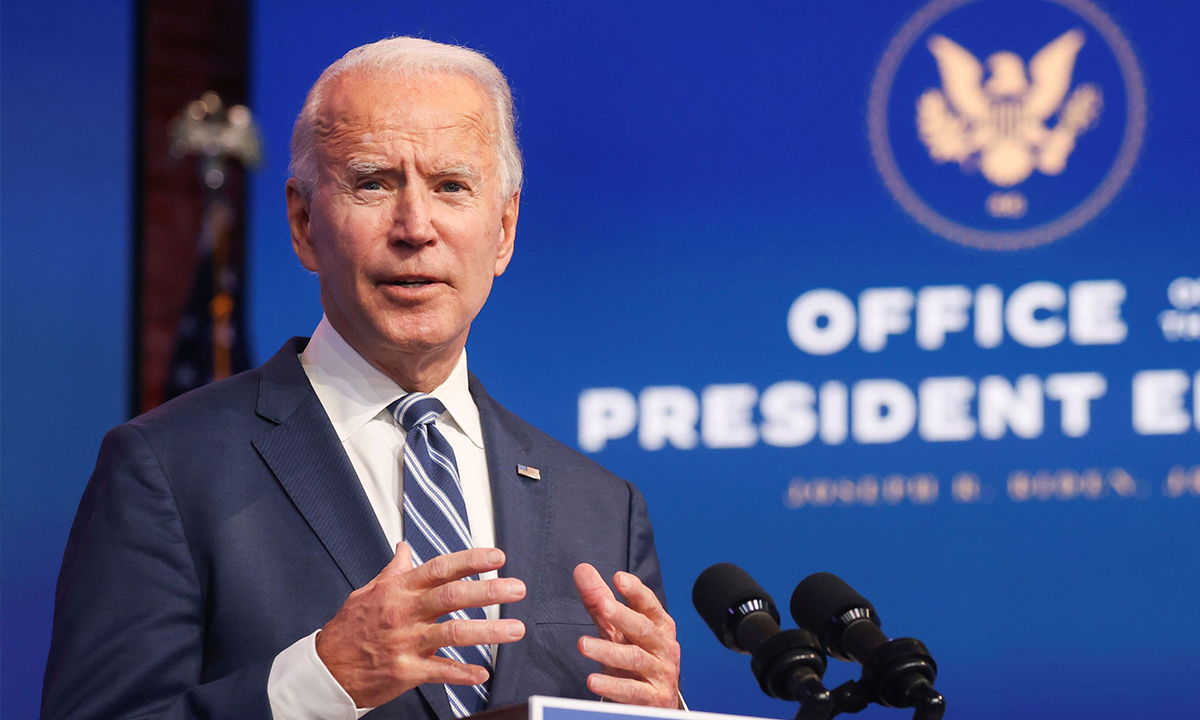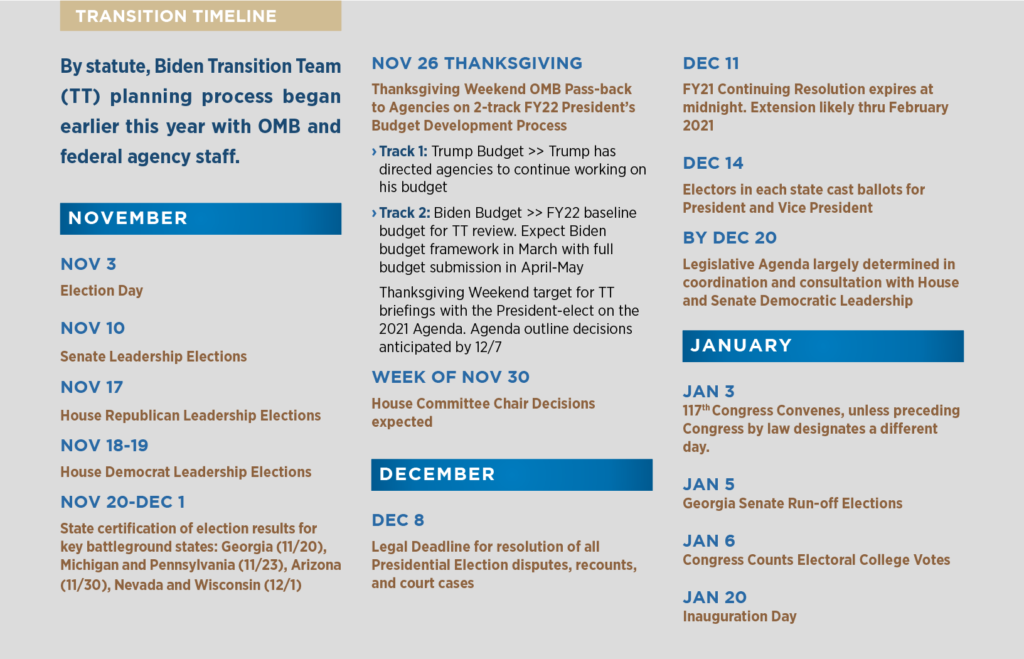November 23, 2020
FBIQ’s Initial Post-Election Market Outlook


On January 20th, President-elect Biden will take the oath of office becoming the 46th President of the United States. Until then, as Biden has stated, a dark winter looms. The task ahead for the Biden-Harris transition team and the lame duck Congress is complicated by an alarming rise in COVID-19 cases, President Trump’s refusal to concede defeat, and two January 5th Georgia run-off elections. The Georgia elections will determine control of the U.S. Senate in the 117th Congress and limit prospects for bipartisan compromise in the interim.
Election Results
First, although recounts and challenges delayed the election certification process in several states, Biden will secure the electoral votes needed to win this election. Victory requires 270 Electoral College votes, the current count gives Biden 306, the same number Trump secured in 2016.
…[I]f we can decide not to cooperate, then we can decide to cooperate. And I believe that this is part of the mandate from the American people. They want us to cooperate.
That’s the choice I’ll make. And I call on the Congress—Democrats and Republicans alike—to make that choice with me.
Excerpt from President-elect Biden’s Victory Speech, November 7th
Even without a Trump concession, the dust should settle soon. Two legal deadlines should effectively end the Presidential race by mid-December, as they did in the last contested election (2000).
By December 8th, all Presidential election disputes must be resolved, including recounts and court cases.
Electors in each state cast ballots for President and Vice President on December 14th.
Relative to expectations, the biggest losers in this election appear to be Speaker Pelosi (D-CA) and Senate Democratic Leader Schumer (D-NY). Both anticipated a blue wave election that didn’t materialize. Actions by both contributed to the disappointing result.
The Transition
The Biden-Harris win triggers a pivotal redirection of government, similar to the policy shift that occurred from Obama to Trump in 2017, but with the added burden of restoring faith in government institutions. The transition also makes Biden, not Pelosi, the de facto leader of the Democratic party. The global pandemic, a divisive election that won’t fully be resolved before January, a sitting President reluctant to cooperate, and GSA delays in the release of transition funding make Biden’s transition the most difficult in the past 50 years.
As VP-elect, Biden played an active role in the formulation and legislative strategy for the $787 billion 2009 American Recovery and Reinvestment Act (ARRA). Drafted largely during the transition, ARRA provided a cash infusion to state and local governments that also waived matching requirements for a variety of activities and provided targeted relief to sectors—most famously autos—impacted by the great recession. That legislation was shaped by the transition team with former Rep. Rahm Emanuel (D-IL)—who became Obama’s initial White House Chief of Staff—leading the effort with then-Chairman of the House Appropriations Committee Obey (D-WI). Biden and his transition team are following that precedent.
Tasked with fleshing out Biden’s 100-day agenda, the transition team (TT) is consulting with Pelosi and Schumer leadership staff and senior staff from key Committees—Appropriations, Ways & Means and Energy & Commerce in the House and Finance in the Senate—on the content and roll-out of President-elect Biden’s legislative agenda.
The goal was to complete a series of key decisions by mid-December that could be incorporated into Biden’s Inaugural Address. They began this process ahead of schedule targeting Thanksgiving weekend for TT briefings with the President-elect on the 2021 agenda with decisions on an agenda outline anticipated by December 7th. GSA’s refusal to release funds to the transition and the Trump Administration’s stubborn, tweet-filled refusal to provide the transition team access to critical information could slip that schedule a week.
In the short-term, Trump’s intransigence and the Georgia run-offs limit what the lame duck Congress can do. For example, after an initial flurry, progress on a large lame duck COVID-19 relief package stalled. That impasse reduces prospects for completing FY21 appropriations this year. The combination could delay the planned roll-out of a large, spring infrastructure package to summer.
FORECAST
70% Final FY21 funding decisions for most agencies is delayed until Feb. 2021.
COVID-19 Response
The Georgia run-off election results could change Senate Majority Leader McConnell’s role from chief legislative roadblock to the Democrats’ agenda to chief deal-maker. McConnell and Biden have a long deal-making history together highlighted by Biden’s successful work with McConnell as President Obama’s chief negotiator on a 2012 plan to avoid the “fiscal cliff.”
Although McConnell initially appeared interested in a year-end COVID-19 relief bill that includes some relief for cash-strapped state and local governments, he, Pelosi, and Schumer quickly reverted to campaign mode. Evidence is their collective unwillingness to budge from pre-election positions on the size and content of a COVID-19 relief bill.
With divided government, action-forcing events often drive the legislative process. They typically include expiring authorities, legal deadlines, and actions needed to protect the health and safety of millions of Americans. Since May, that last category, the most important one, shockingly hasn’t made the cut. While we hope that changes in the days ahead, recent actions by Trump, Pelosi, McConnell and Schumer point to a continued political stalemate.
Despite the political drama, good news is coming.
By Inauguration Day, an agreement on the size and shape of additional COVID-19 relief should emerge. In May, we forecast that by year-end an additional $2 trillion in COVID-19 relief would be approved to control the spread of the virus, provide relief to economic sectors and individuals, provide needed testing and contact tracing resources for schools, businesses and other institutions to reopen safely, and set up safe-harbor protections for reopening institutions. Even with the recent COVID caseload surge, a divided Congress means the next relief installment falls short of the May $3.4 trillion House-passed Heroes Act and shifts the funding mix to put greater emphasis on economic stimulus.
In the interim, we expect the “lame duck” session to avoid a government shutdown with a continuing resolution that runs through February 2021, approval of extended unemployment benefits, extension of expiring COVID-related authorities, and needed funding for vaccine distribution.

